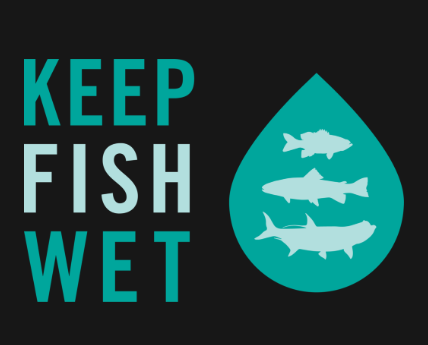Keeping Fish Wet: Protecting Maine's Aquatic Treasures
 The 2024 season is well underway with a few trips and many more in my calendar for the next few months. As things get started, I reflect on how I am fortunate that out local rivers, lakes, and coastal waters teem with a diverse array of fish species. From pickerel to perch bass and stripers, these aquatic creatures are not only a source of recreation for anglers, but also a vital part in our ecosystem.
The 2024 season is well underway with a few trips and many more in my calendar for the next few months. As things get started, I reflect on how I am fortunate that out local rivers, lakes, and coastal waters teem with a diverse array of fish species. From pickerel to perch bass and stripers, these aquatic creatures are not only a source of recreation for anglers, but also a vital part in our ecosystem.
That's why I am participating in the Keep Fish Wet initiative, spearheaded by a coalition of conservation organizations. The premise is simple: by minimizing the time fish spend out of the water during catch-and-release angling, anglers can significantly improve their chances of survival and maintain the health of our fisheries.
The Importance of Keeping Fish Wet
When fish are removed from the water, even briefly, they experience significant stress that can lead to injury or even death. This is especially true for species like trout and salmon, which are highly sensitive to changes in their environment. By keeping fish wet and limiting air exposure, we can dramatically increase the odds of a successful release. For this reason, I like to take charge of handling the fish to help things go quickly and efficiently.
Tips for Keeping Fish Wet
The Keep Fish Wet approach is easy to implement and can be tailored to any angling situation. Some key tips include:
Use Wet Hands or Gloves
Avoid touching the fish's delicate scales, which can be damaged by dry hands. Instead, use wet hands or specialized gloves to handle the fish.
Minimize Air Exposure
Keep the fish in the water as much as possible during the unhooking and photographing process. If the fish must be removed from the water, limit the time to just a few seconds. You can help by getting your camera ready even before the fish is in the net.
Use Appropriate Landing Gear
I have and use a rubberized landing net to cradle and gently support the fish while it's out of the water. I like it and recommend that you use one too.
By following these simple guidelines, we can do our part to protect Maine's aquatic treasures and ensure that future generations can enjoy the thrill of catching these fish just like we are able to do on your trip.
For more information check the initiative out.


